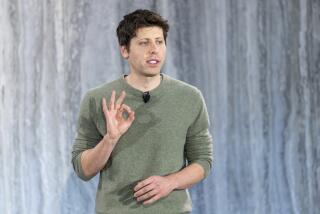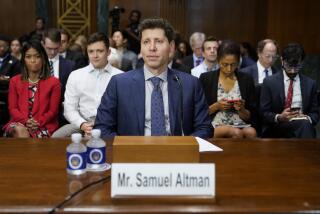AST Struggling Back Following Founders’ Rift : Partner Left After Years of Consensus Management
- Share via
About a year ago, when AST Research’s computer sales were sizzling and its stock was soaring, the company’s three young founders decided to treat themselves. They all went out and bought fancy new cars.
Albert C. Wong and Thomas C. K. Yuen drove up to work in identical black Ferrari Testarossas. Safi U. Qureshey, displaying more modest taste, showed up in a top-of-the-line BMW.
Whether purchasing cars or plotting corporate strategy, AST’s top executives followed a “Three Musketeers”-type philosophy after forming their company in 1980. They named the company by using the initials of their first names and chose their original job titles by literally picking them out of a hat. They later shared the title of co-chairman, drew the same salaries and decorated their offices almost identically. They were not just business partners but also close friends.
New employees at the Irvine firm soon learned that important company decisions weren’t final until Albert, Safi and Tom--as AST workers call them--gave their collective stamp of approval.
But somewhere along the line, something went wrong.
The first sign of trouble came in November when Wong, the company’s technology chief, abruptly resigned. “The reason I left was the partners,” Wong said in a recent interview. “We just didn’t get along.”
In eight years, AST’s founders had gone from being three enthusiastic entrepreneurs working 16-hour days in an 800-square-foot office in Irvine to millionaire executives trying to run the daily operations of a big, fast-growing enterprise. AST is now one of the nation’s leading manufacturers of IBM-compatible personal computers and it is expected to surpass $500 million in sales in 1989.
But the AST story is also a case study of the strains that young entrepreneurs endure when a company grows, prospers and then stumbles along the way to becoming a major corporation. It also shows how idealistic visions, such as the AST founders’ egalitarian approach to management, sometimes don’t work in the business world.
“When you start a company, you are really doing it for yourselves,” AST’s Qureshey said. “We have learned that we have to take a much more objective, businesslike approach. It doesn’t mean that our values are less important. But we know we cannot treat the company as our personal property.”
AST’s founders say one thing that bound them together was their similar backgrounds. All came to the United States to study engineering. Yuen and Wong came from Hong Kong to Orange Coast College in Costa Mesa, where they were roommates. Qureshey, a Pakistani, studied engineering in Texas.
Refinanced Homes
Qureshey and Yuen met at Computer Automation, an Irvine computer maker. In 1980, the three decided to strike out on their own, using $50,000 they raised by refinancing their homes.
“We all wanted to move up faster and sooner,” said Yuen, AST’s chief operating officer.
After selecting the company’s name over a meal at a Carl’s Jr. restaurant, the founders started a computer consulting firm specializing in the mid-range computer business.
But in August, 1981, International Business Machines introduced its first personal computer, prompting AST to enter a new field. By December, AST was out with its first product, a printed circuit board that made it easier and cheaper to boost the memory of IBM’s PC.
“We sold our first board to a customer in Orange County,” Qureshey recalled. “They sent us a check for $82, and the check bounced. It was not a good feeling.”
Revenue Soared
By 1986, AST had become the leading producer of add-on products designed to increase the memory and capabilities of PCs. The add-on business began to slow about that time, though, because newer PCs didn’t require as much extra equipment. So AST decided to build its own personal computers. Its first model, the Premium/286, was a big success. Revenue soared to $412 million for the year ended June 30, 1988, doubling the year-earlier revenue of $206 million.
From the start, AST’s founders shared in managing the company and divided up their responsibilities according to respective skills and interests. Yuen focused on marketing and sales. Wong oversaw engineering and manufacturing. And Qureshey divided his time among several areas.
The founders referred to each other as “partner” and never by their titles. They made decisions as a group, discussing issues until they reached a consensus. They took no votes on issues to avoid having any one of them come out on the short end of a 2-1 vote.
But as AST continued to grow, the unusual power-sharing arrangement began to show signs of strain. Those differences became more critical when AST’s earnings slipped in mid-1988, despite soaring sales.
Wong eventually departed, and two months later, AST had a stunning financial setback. The company in late January reported its largest quarterly loss ever, a whopping $8.9-million deficit. The second-quarter loss resulted in AST cutting 6% of its worldwide work force, or 120 jobs.
Falling Out Denied
Initially, Wong’s departure appeared to be just another story of a computer-whiz-turned-millionaire quitting to enjoy the good life. At the time of his departure, the founders, including Wong himself, denied that there had been a falling out. But Wong, who remains an AST director and major shareholder, recently has been more forthcoming about why he left.
According to Wong’s account, the tensions that led to his eventual departure had been building for about two years. Increasingly, Wong was finding himself in disagreement with Qureshey and Yuen on key decisions.
“When a company is doing fantastic, then a lot of problems can be shoved under the table,” said Wong, who after leaving AST formed a small real estate company, DMK Development Corp., in Laguna Hills. But when AST began to stumble, tensions arose.
The dispute that led to Wong’s departure centered on a new PC the company planned to introduce. According to Wong, Yuen wanted to ship the new machine to customers before Wong, who headed up engineering, felt that the product was ready.
Several AST vice presidents tried unsuccessfully to mediate the dispute between Yuen and Wong. But, Wong said, “I didn’t want to compromise.”
No Longer Working
The underlying problem, the founders agree, was that their unusual arrangement of sharing the decision-making authority as co-chairmen was no longer working.
“It got all of us frustrated,” said Wong, who still owns a 16% stake in AST worth about $13 million.
Qureshey and Yuen also acknowledge the problems with the founders’ relationship.
The founders “had a lot of respect for each other’s opinions,” Yuen said. “But when the opinions diverged, the easiest way was to not argue and just back away. We didn’t want to create a personal confrontation.”
As a result, Yuen added, decisions were sometimes delayed or not made at all and “the company became lethargic.”
The two remaining founders are careful to avoid direct criticism of Wong, but they say the company has run more smoothly since his departure.
‘More Common Values’
“Safi and I have more common values and vision,” Yuen said. “And that has made it much easier for us to work together.”
Since Wong’s departure, Qureshey and Yuen say they have also attempted to delegate more decision-making authority to an eight-member executive committee made up of themselves and other top managers.
“We know where we’re going now and it’s very different now from six months ago,” Qureshey said.
In public comments after his departure that particularly irked Qureshey and Yuen, Wong has suggested that the day-to-day operations might be better handled by a professional manager.
“I feel Safi and Tom can bring the company around” from its recent financial troubles, Wong said. “But I hope eventually they will bring on board some capable people to run the business. The founder can’t be worrying about whether this screw is the right one to put in the computer, and we were doing that.”
Idea Scoffed At
But Yuen and Qureshey scoff at that idea. They say they have no plans to bring in a new chief executive or chief operating officer.
“It is sometimes a disturbing feeling to have your partner feel you don’t have management experience,” Yuen said. “Does it make any difference that we don’t have Harvard MBAs? I don’t think so. We have a lot of hard-earned experience.”
Meanwhile, some Wall Street analysts say they are encouraged by the direction AST has taken during the past six months. Although the company posted a net loss of $1.3 million for the quarter ended March 31, it had a small operating profit of $423,000, on sales of $113.8 million.
Analysts reacted positively to that news because the loss was smaller than anticipated and a substantial improvement over the previous quarter’s loss of $8.9 million. Several have predicted that the company should make a net profit in the fourth quarter ending June 30.
“I’m more encouraged than I was six months ago,” said Jay Vleeschouwer, an analyst at Bear, Stearns & Co. in New York. “They have done a number of things to improve their balance sheet.”
Family Tragedy
In the past two months, Yuen has been called on more than ever to lead the company. Qureshey has spent a lot of time away from his office because of a family tragedy involving his young daughter, who was critically injured in a swimming pool accident. The daughter is recovering at an Orange County medical clinic.
The three founders and longtime friends say the parting was difficult. But they add that they have managed to keep their friendship, despite their differences.
Wong says he wishes AST well and believes the company will “prove itself” in the long run. But he says he avoids driving his Ferrari past AST’s current offices or its new headquarters under construction in Irvine. He says the idea that he is no longer part of the company is still too painful.
More to Read
Inside the business of entertainment
The Wide Shot brings you news, analysis and insights on everything from streaming wars to production — and what it all means for the future.
You may occasionally receive promotional content from the Los Angeles Times.










